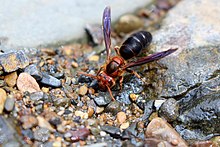| Black-bellied hornet | |
|---|---|

| |
|
Scientific classification
| |
| Domain: | Eukaryota |
| Kingdom: | Animalia |
| Phylum: | Arthropoda |
| Class: | Insecta |
| Order: | Hymenoptera |
| Family: | Vespidae |
| Genus: | Vespa |
| Species: | V. basalis
|
| Binomial name | |
| Vespa basalis Smith, 1852
| |
The black-bellied hornet (Vespa basalis) is a species of hornet native to Taiwan. It is one of the most dangerous species of hornet on the island, and its venom induces edema. [1] Colonies may have as many as 5,000 individual hornets. [2]
Distribution
Introduced
None known. [3] One specimen was photographed in Richmond, British Columbia, Canada, in July 2019 and was identified by several experts as V. basalis. [4] [5] [6] However there have been no other sightings and this is believed to not represent a local population. [4] [5] [6]
References
- ^ Toxicology abstracts. 1992. p. 64.
- ^ Ronald Jenner; Eivind Undheim (2017). Venom: The Secrets of Nature's Deadliest Weapon. Smithsonian Institution. p. 92. ISBN 978-1-58834-454-0.
- ^ "Black-bellied Hornet (Vespa basalis)". iNaturalist. 2018-08-22. Retrieved 2020-12-26.
- ^ a b Kozak, Paul; Otis, Gard. "From the Province" (PDF). Ontario Animal Health Network.
- ^ a b "Proceedings 2019/20" (PDF). Hilton Garden Inn, Ottawa, Ontario: Canadian Association of Professional Apiculturists. 2020-01-21.
- ^ a b Potter, Tammy Horn. Reed, Mary (ed.). "May-June 2020" (PDF). Apiary Inspectors of America.
| Black-bellied hornet | |
|---|---|

| |
|
Scientific classification
| |
| Domain: | Eukaryota |
| Kingdom: | Animalia |
| Phylum: | Arthropoda |
| Class: | Insecta |
| Order: | Hymenoptera |
| Family: | Vespidae |
| Genus: | Vespa |
| Species: | V. basalis
|
| Binomial name | |
| Vespa basalis Smith, 1852
| |
The black-bellied hornet (Vespa basalis) is a species of hornet native to Taiwan. It is one of the most dangerous species of hornet on the island, and its venom induces edema. [1] Colonies may have as many as 5,000 individual hornets. [2]
Distribution
Introduced
None known. [3] One specimen was photographed in Richmond, British Columbia, Canada, in July 2019 and was identified by several experts as V. basalis. [4] [5] [6] However there have been no other sightings and this is believed to not represent a local population. [4] [5] [6]
References
- ^ Toxicology abstracts. 1992. p. 64.
- ^ Ronald Jenner; Eivind Undheim (2017). Venom: The Secrets of Nature's Deadliest Weapon. Smithsonian Institution. p. 92. ISBN 978-1-58834-454-0.
- ^ "Black-bellied Hornet (Vespa basalis)". iNaturalist. 2018-08-22. Retrieved 2020-12-26.
- ^ a b Kozak, Paul; Otis, Gard. "From the Province" (PDF). Ontario Animal Health Network.
- ^ a b "Proceedings 2019/20" (PDF). Hilton Garden Inn, Ottawa, Ontario: Canadian Association of Professional Apiculturists. 2020-01-21.
- ^ a b Potter, Tammy Horn. Reed, Mary (ed.). "May-June 2020" (PDF). Apiary Inspectors of America.